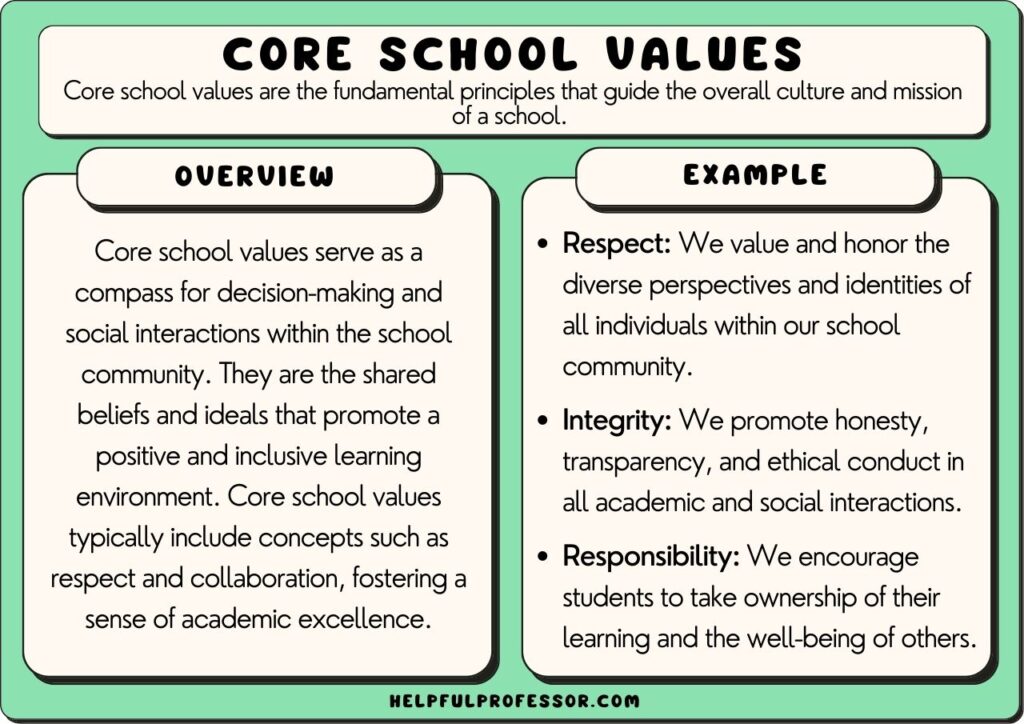Ethical investing options for high schoolers are gaining popularity as young people seek to align their investments with their values. This approach goes beyond simply maximizing financial returns, focusing instead on companies and projects that contribute positively to society and the environment.
By investing ethically, high schoolers can make a tangible impact on the world while building a solid financial foundation for their future.
This guide explores the diverse world of ethical investing, providing a comprehensive overview of different approaches, practical considerations, and valuable resources for young investors. We’ll delve into the motivations behind ethical investing, examine the various types of ethical investment strategies, and discuss the challenges and opportunities associated with this growing trend.
Introduction
Ethical investing, also known as socially responsible investing (SRI), is a way to invest your money in companies and organizations that align with your values. Instead of just focusing on financial returns, ethical investors consider the social and environmental impact of their investments.
This means choosing companies that are committed to sustainability, human rights, and ethical business practices.Ethical investing is particularly important for high schoolers because it allows you to make a positive impact on the world with your money. As you begin to think about your future financial goals, ethical investing provides a way to invest in companies that are working towards a better future for everyone.
You can make a difference by supporting companies that are tackling climate change, promoting social justice, or creating a more equitable world.
Ethical Investing Principles
Ethical investing is guided by a set of principles that help investors make informed decisions. These principles can vary depending on the investor’s values, but some common ones include:
- Environmental Sustainability:Investing in companies that are committed to reducing their environmental impact and promoting sustainable practices.
- Social Responsibility:Investing in companies that treat their employees fairly, respect human rights, and contribute to the well-being of their communities.
- Corporate Governance:Investing in companies with strong corporate governance practices, such as transparency, accountability, and ethical leadership.
Types of Ethical Investing

Ethical investing, also known as sustainable or responsible investing, encompasses a wide range of approaches that consider environmental, social, and governance (ESG) factors alongside financial returns. This section explores the diverse types of ethical investing approaches, highlighting their unique features, goals, and real-world examples.
ESG Investing
ESG investing integrates environmental, social, and governance factors into investment decisions. This approach aims to identify companies with strong ESG practices, believing that these factors can contribute to long-term financial performance and a positive impact on society and the environment.
- Environmental factors: These include a company’s environmental footprint, resource consumption, and pollution emissions. Examples include companies investing in renewable energy, reducing their carbon emissions, and promoting sustainable practices.
- Social factors: These consider a company’s labor practices, human rights record, and community engagement. Examples include companies that promote diversity and inclusion, fair wages, and ethical supply chains.
- Governance factors: These focus on a company’s corporate governance structure, transparency, and accountability. Examples include companies with strong board independence, ethical leadership, and robust risk management practices.
Impact Investing
Impact investing seeks to generate both financial returns and positive social or environmental impact. This approach aims to invest in companies or projects that address specific social or environmental challenges, such as poverty alleviation, climate change, or access to healthcare.
- Impact measurement: Impact investing emphasizes measuring and tracking the social and environmental impact of investments. This involves defining clear impact goals, collecting data on outcomes, and reporting on the impact achieved.
- Examples: Companies or organizations that provide clean water solutions, promote sustainable agriculture, or offer affordable housing can be considered impact investments. Examples include funds like the Global Impact Investing Network (GIIN) and the Calvert Foundation.
Socially Responsible Investing (SRI)
Socially responsible investing (SRI) considers ethical and social values in investment decisions. This approach avoids investing in companies involved in activities considered harmful, such as tobacco, gambling, or weapons manufacturing.
- Negative screening: SRI often employs negative screening, excluding companies from investment portfolios based on their involvement in specific industries or activities deemed unethical.
- Examples: Many mutual funds and exchange-traded funds (ETFs) follow SRI principles, such as the Domini 40 Social Index Fund (DOISX) and the Pax World Global Fund (PXWIX). These funds exclude companies involved in activities like tobacco, weapons manufacturing, and fossil fuels.
Ethical Investing Resources for High Schoolers: Ethical Investing Options For High Schoolers

Ethical investing is gaining popularity among young investors, and there are many resources available to help high schoolers navigate this exciting field. These resources can provide valuable information and tools to guide you in making informed investment decisions that align with your values.
Online Resources for Ethical Investing
Online resources play a crucial role in educating high schoolers about ethical investing. These platforms offer a wealth of information, tools, and guidance to help you understand the different aspects of responsible investing.
- Ethical Investment Websites:Websites like As You Sow, Greenpeace, and Sustainalyticsprovide comprehensive information about ethical investing principles, industry trends, and company rankings based on their environmental, social, and governance (ESG) performance. These websites offer detailed reports, research papers, and interactive tools to help you identify companies that align with your values.
- Financial Education Platforms:Websites like Investopedia, Khan Academy, and NerdWalletoffer educational resources on various investment topics, including ethical investing. They provide articles, videos, and interactive quizzes to help you understand the basics of investing and how to incorporate ethical considerations into your investment decisions.
- ESG Rating Agencies:Agencies like MSCI, Sustainalytics, and Morningstarprovide ratings and analysis of companies based on their ESG performance. These ratings can help you assess the ethical and sustainability practices of companies you are considering investing in. You can access these ratings through their websites or through financial platforms that integrate their data.
Researching and Evaluating Ethical Investment Options
Before making any investment decisions, it’s essential to thoroughly research and evaluate potential ethical investment options. Here are some tips and strategies:
- Define Your Values:Begin by identifying your core values and ethical priorities. What issues are most important to you? For example, you might prioritize environmental sustainability, social justice, or animal welfare. Once you understand your values, you can look for investment options that align with them.
- Research Companies:Research the companies you are considering investing in. Look for information about their ESG performance, including their environmental practices, labor standards, and corporate governance policies. You can find this information on company websites, ESG rating agencies, and news articles.
- Consider Investment Funds:Ethical investment funds are a convenient way to invest in a portfolio of companies that align with your values. These funds are managed by professional investors who select companies based on specific ethical criteria. Research different funds and their investment strategies to find one that aligns with your values and risk tolerance.
Incorporating Ethical Investing into a High Schooler’s Portfolio
Ethical investing can be a valuable part of a high schooler’s portfolio. Here are some strategies for incorporating it:
- Start Small:You don’t need a lot of money to start investing ethically. Begin with a small amount and gradually increase your investment as you learn more about the market and your values.
- Diversify Your Portfolio:Diversification is essential for any investment portfolio, and ethical investing is no exception. Invest in a variety of companies and sectors to reduce risk and potentially increase returns.
- Long-Term Perspective:Ethical investing is a long-term strategy. Don’t expect to get rich quickly. Instead, focus on building a sustainable portfolio that aligns with your values and financial goals.
Practical Considerations for Ethical Investing
While ethical investing is a noble endeavor, it’s essential to acknowledge the practical challenges involved. Balancing ethical values with financial returns can be tricky, and finding ethical investment options might require extra effort.
Balancing Ethics and Returns, Ethical investing options for high schoolers
Finding ethical investments that align with your values while still generating a decent return can be a challenge. Many ethical funds and companies may have lower returns compared to conventional investments. However, this doesn’t necessarily mean they are bad investments.
It’s important to remember that ethical investing is a long-term approach, and returns can fluctuate over time.
Ethical Investing Approaches
Different ethical investing approaches have varying pros and cons.
Ethical investing options for high schoolers can be a powerful tool for shaping a more sustainable future. By understanding the impact of their investments, young people can choose to support companies that prioritize environmental and social responsibility. For instance, considering the role of technology in education, investing in companies that promote responsible use of gadgets, like those explored in The impact of student gadgets on learning , aligns with ethical principles.
By aligning their investments with their values, high schoolers can make a positive difference in the world while building a strong financial foundation.
Pros and Cons of Ethical Investing Approaches
| Approach | Pros | Cons |
|---|---|---|
| Negative Screening | – Avoids investing in companies involved in harmful activities.- Allows for targeted exclusion of specific industries or practices. | – May miss out on investment opportunities in companies that are making positive changes.- Can be difficult to define and enforce ethical criteria. |
| Positive Screening | – Focuses on investing in companies with strong ethical practices.- Promotes positive social and environmental impact. | – May have limited investment options, especially in niche sectors.- Can be challenging to verify and assess the ethical practices of companies. |
| ESG Investing | – Considers environmental, social, and governance factors in investment decisions.- Provides a comprehensive framework for evaluating ethical investments. | – Can be complex and require specialized knowledge to understand and apply.- May not always align with individual ethical values. |
| Impact Investing | – Aims to generate both financial returns and positive social and environmental impact.- Offers a direct way to contribute to specific causes. | – Can be more risky than other approaches.- May have limited investment opportunities. |
Mitigating Challenges
To mitigate the challenges of ethical investing, consider these strategies:
Conduct thorough research
Investigate the ethical practices of companies and investment funds before investing. Use resources like ethical investment databases and ESG ratings to evaluate companies.
Set realistic expectations
Understand that ethical investing may involve some trade-offs in terms of returns. Be prepared for potential fluctuations and consider the long-term perspective.
Diversify your portfolio
Spread your investments across different ethical sectors and approaches to reduce risk and potentially enhance returns.
Engage with your investments
Participate in shareholder meetings, advocate for ethical practices, and stay informed about the companies you invest in.
Seek professional advice
Consider working with a financial advisor specializing in ethical investing to help you make informed decisions.
Ethical Investing and the Future

Ethical investing, also known as sustainable or responsible investing, is gaining significant traction globally. It’s no longer a niche approach but a mainstream movement driven by a growing awareness of environmental and social issues and a desire to align investments with personal values.
The Growing Trend of Ethical Investing
Ethical investing is experiencing a surge in popularity, with investors increasingly seeking opportunities to invest in companies that contribute positively to society and the environment. This trend is fueled by several factors, including:
- Growing awareness of environmental and social issues:Climate change, social inequality, and human rights violations are becoming increasingly prominent concerns, prompting investors to consider the ethical implications of their investments.
- Increased availability of ethical investment options:The number of ethical investment funds and products has expanded significantly in recent years, making it easier for investors to access this market.
- Shifting investor priorities:Millennials and Gen Z, who are more likely to prioritize ethical considerations, are entering the investment market, driving demand for ethical investment options.
- Institutional adoption:Large institutional investors, such as pension funds and endowments, are increasingly incorporating ethical factors into their investment decisions.
Impact on Financial Markets
The rise of ethical investing is having a tangible impact on financial markets:
- Increased demand for ethical companies:Ethical investors are driving demand for companies that adhere to high environmental, social, and governance (ESG) standards, potentially leading to higher valuations for these companies.
- Pressure on companies to improve ESG performance:The growing focus on ethical investing is pushing companies to improve their ESG performance to attract investors and avoid reputational damage.
- Development of new investment products:The demand for ethical investment options is prompting the development of new products and services, such as ESG-focused ETFs and impact bonds.
Examples of Positive Social and Environmental Change
Ethical investing can contribute to positive social and environmental change through various means:
- Investing in renewable energy:Investing in companies developing renewable energy technologies can help reduce greenhouse gas emissions and transition to a cleaner energy future. For example, investing in a company like Tesla, a leading electric vehicle manufacturer, can support the adoption of sustainable transportation.
- Supporting fair labor practices:Investing in companies that adhere to fair labor practices, such as paying living wages and ensuring safe working conditions, can promote social justice and economic empowerment. For example, investing in a company like Patagonia, known for its commitment to fair trade and ethical sourcing, can support responsible labor practices.
- Promoting diversity and inclusion:Investing in companies that promote diversity and inclusion in their workforce and leadership can contribute to a more equitable and just society. For example, investing in a company like Unilever, which has a strong commitment to diversity and inclusion, can support a more inclusive workplace.
Ethical Investing as a Long-Term Investment Strategy
Ethical investing is not just about doing good; it can also be a sound long-term investment strategy:
- Potential for long-term growth:Companies with strong ESG performance tend to be more resilient and adaptable, potentially leading to better long-term financial performance.
- Reduced risk:Ethical investing can help mitigate investment risk by avoiding companies with poor ESG performance, which may be more susceptible to financial scandals or regulatory penalties.
- Alignment with personal values:Ethical investing allows investors to align their investments with their personal values, creating a sense of purpose and satisfaction.
Ethical Investing for High Schoolers
Ethical investing can be a valuable way for high schoolers to start building a responsible investment portfolio. By incorporating ethical considerations into their investment decisions, high schoolers can:
- Make a positive impact:Their investments can contribute to a more sustainable and equitable future.
- Develop financial literacy:Learning about ethical investing can help them understand the broader financial landscape and make informed investment decisions.
- Build a responsible investment portfolio:They can start building a portfolio that aligns with their values and financial goals.
Ultimate Conclusion
Ethical investing empowers high schoolers to be active participants in shaping a more sustainable and equitable future. By understanding the principles, resources, and strategies involved, young investors can make informed decisions that align their investments with their values. As the movement towards ethical investing continues to grow, it’s clear that the next generation of investors is poised to play a pivotal role in driving positive change through their investment choices.
Top FAQs
What are the potential risks of ethical investing?
While ethical investing aligns with values, it’s important to acknowledge potential risks. Finding ethical options might be limited, and balancing ethical values with financial returns can be challenging. However, these risks can be mitigated through thorough research, diversification, and a long-term investment perspective.
How can I start ethical investing with a small amount of money?
There are various ways to start ethical investing with limited funds. Consider investing in ethical mutual funds or exchange-traded funds (ETFs) that align with your values. Many platforms offer fractional shares, allowing you to invest in companies even with small amounts.
Are there any specific ethical investing resources tailored for high schoolers?
Yes, several online resources are specifically designed for young investors. Websites like GreenBiz, The Conscious Investor, and ImpactAlpha provide educational content, news, and tools for ethical investing. Additionally, organizations like the Sustainable Investing Alliance offer programs and resources tailored for high schoolers.